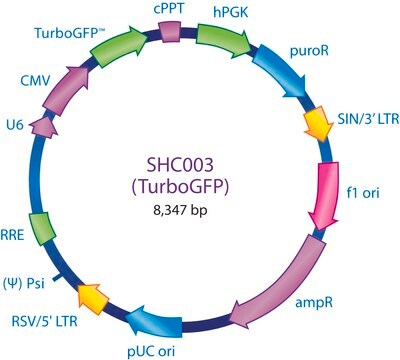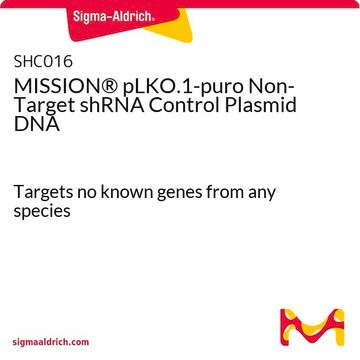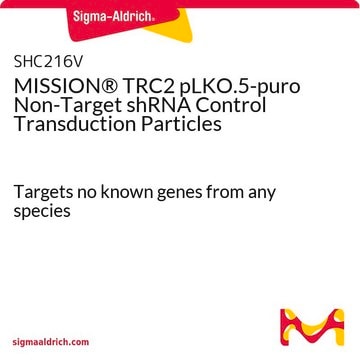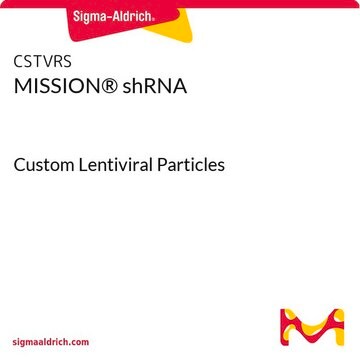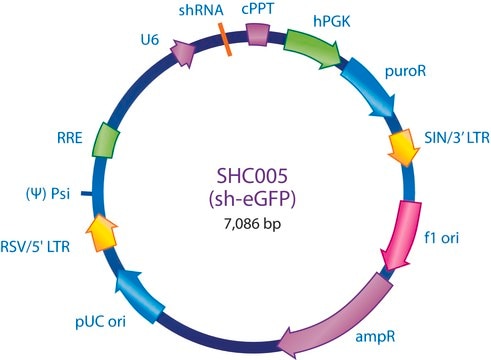SHC002V
MISSION® pLKO.1-puro Non-Mammalian shRNA Control Transduction Particles
Targets no known mammalian genes
Synonym(s):
MISSION®, MISSION® Control Transduction Particles
About This Item
Recommended Products
Quality Level
100
200
product line
MISSION®
concentration
≥1x106 VP/ml (via p24 assay)
technique(s)
capture ELISA: 106 TU/mL using p24
shipped in
dry ice
storage temp.
−70°C
Looking for similar products? Visit Product Comparison Guide
Related Categories
General description
Small interfering RNAs (siRNAs) expressed from short hairpin RNAs (shRNAs) are a powerful way to mediate gene specific RNA interference (RNAi) in mammalian cells. The MISSION product line is based on a viral vector-based RNAi library against annotated mouse and human genes. shRNAs that generate siRNAs intracellularly are expressed from amphotropic lentivirus viral particles, allowing screening in a wide range of mammalian cell lines. In these cell lines, MISSION shRNA clones permit rapid, cost efficient loss-of-function and genetic interaction screens.
The lentiviral transduction particles are produced from an shRNA lentiviral non-target control plasmid. It is useful as a negative control in experiments with the MISSION shRNA target sets.
Unlike murine-based MMLV or MSCV retroviral systems, lentiviral-based particles permit efficient infection and integration of the specific shRNA construct into differentiated and non-dividing cells, such as neurons and dendritic cells,1 overcoming low transfection and integration difficulties when using these cell lines. Self-inactivating replication incompetent viral particles are produced in packaging cells (HEK293T) by co-transfection with compatible packaging plasmids.2-3
In addition, the lentiviral transduction particles are pseudotyped with an envelope G glycoprotein from vesicular stomatitis virus (VSV-G), allowing transduction of a wide variety of mammalian cells.4 The lentiviral transduction particles are titered via a p24 antigen ELISA assay and pg/ml of p24 are then converted to transducing units per ml using a conversion factor. The conversion can be viewed at: www.tronolab.com.
To see more application data, protocols, vector maps visit sigma.com/shrna.
Application
Legal Information
Not finding the right product?
Try our Product Selector Tool.
recommended
Storage Class
12 - Non Combustible Liquids
wgk_germany
WGK 3
flash_point_f
Not applicable
flash_point_c
Not applicable
ppe
Eyeshields, Gloves, multi-purpose combination respirator cartridge (US)
Certificates of Analysis (COA)
Search for Certificates of Analysis (COA) by entering the products Lot/Batch Number. Lot and Batch Numbers can be found on a product’s label following the words ‘Lot’ or ‘Batch’.
Already Own This Product?
Find documentation for the products that you have recently purchased in the Document Library.
Customers Also Viewed
Articles
Methods for lentiviral transduction of Jurkat cells were compared. Spinoculation was compared with overnight incubation with polybrene (hexadimethrine bromide) and fibronection-coated plates.
Protocols
This detailed procedure allows you to transduce Mouse Embryonic Fibroblasts (MEF) using MISSION ExpressMag Super Magnetic Kit.
Detailed procedure for how to perform a lentiviral transduction of MISSION shRNA lentiviral particles to achieve a stable long term silencing and phenotypic change.
Our team of scientists has experience in all areas of research including Life Science, Material Science, Chemical Synthesis, Chromatography, Analytical and many others.
Contact Technical Service


